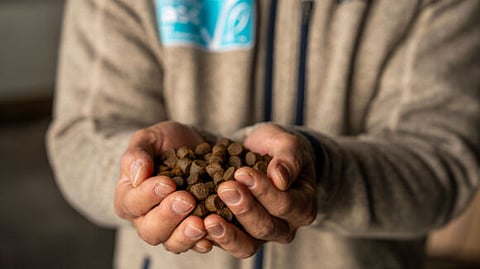

BioMar’s Nersac mill and New Caledonian aquafeed producers SICA and Provenderie Saint Vincent have achieved ASC certification.
Photo: ASC
The Aquaculture Stewardship Council (ASC) has announced that three additional feed mills have been approved under its Feed Standard, marking what the organisation describes as "a milestone for sustainable aquaculture in France and New Caledonia".
As previously reported by WeAreAquaculture, BioMar’s Nersac mill is the first French site to obtain the certification. ASC has now also confirmed that producers SICA and Provenderie Saint Vincent in the French territory of New Caledonia in the South Pacific have also been added to the programme.
According to ASC, the new certifications will make it easier for farmers in both regions to obtain feed that meets the scheme’s requirements on ingredient traceability and responsible production. Since the beginning of November, all ASC-certified aquaculture operations are now required to switch to ASC-certified feed.
“From France to New Caledonia, feed producers are proving that sustainability isn’t limited by geography, it’s driven by commitment, transparency, and a shared vision for change," said Maxime Engler, Market Development Manager France at ASC. "More producers across those regions can now access ASC-conforming feed, making it easier than ever to deliver responsible and traceable seafood.”
“This certification strengthens our ability to support ASC-certified farmers at every production stage. By offering ASC-conforming feed, we help our customers meet evolving market expectations and build value across the full value chain in the western mediterranean region,” said Luis García Romero, Managing Director of BioMar Western Mediterranean Europe and Africa. In addition to its French feed mill, BioMar also recently secured ASC certification for its factory in Spain.
In New Caledonia, the two newly-certified mills are supplying the shrimp sector in the region. Both companies say the process has prompted changes in their sourcing and oversight practices, including diversifying raw material origins, phasing out unsustainable inputs, formalising supplier requirements, and improving environmental monitoring.
“ASC Feed Certification provides an internationally recognised framework, consistent with the growing expectations of consumers, distributors, and NGOs," said Yves Jean-Baptiste, Managing Director of Provenderie Saint Vincent, adding, "It enables the New Caledonian industry to position itself on the global market.”
Meanwhile, Christine Colomina, Head of QHSE and R&D at SICA, said the standard “aligns perfectly with New Caledonian strategies to protect biodiversity, support the local economy, and enhance product credibility internationally, in line with territorial priorities for sustainability and a more responsible industry.”
The ASC Feed Standard is the first of its kind to cover the full supply chain for aquaculture feed, including marine ingredients such as fishmeal and fish oil, and agricultural commodities such as soy, palm oil and wheat. Certified companies must show that these materials are responsibly sourced and that they comply with criteria on working conditions, occupational safety, and environmental management.
Launched in May 2025, the ASC Feed Standard complements the ASC Farm Standard, which governs responsible practices on aquaculture farms. Since 31 October 2025, all ASC-certified farms must now demonstrate that they source feed only from ASC Feed Standard-certified facilities.
